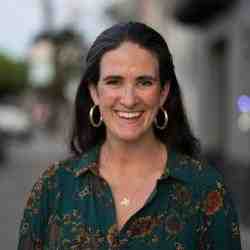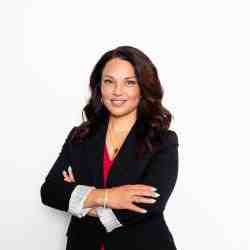Introduction
To combat racism in Brazil, Regina dos Santos is using her training and experience in Black History to increase the participation of black people in television and other visual arts.
The New Idea
Regina is enabling the black community in Brazil to participate in Brazilian television, an area that has historically excluded the country's eighty million black people. By increasing black participation both on and behind the screen, Regina is developing mechanisms to democratize Brazilian television and to establish a national, black television network.
The Problem
Brazil has a population of more than 170 million people, more than half of whom are black. Yet fewer than 5 percent of the actors on nationally broadcast programs are black. In the rare cases in which black actors are found on television, they are often cast in roles that reinforce the negative and racist stereotypes prevalent in Brazil. The problem is especially acute in Brazil because most media outlets (newspaper, radio, and particularly television) are owned by large conglomerates such as Globo. Nearly 50 percent of Brazilians regularly watch Globo TV's eight o'clock soap opera–a program that repeats patterns of racial exclusion and perpetuates racial stereotypes. Millions of black children and adolescents are exposed daily to television programs that reinforce racism and discrimination. Behind the camera, the percentage of black people is even smaller. Local community programs can hardly counter the images broadcast by major television networks. Though small cable companies exist in Brazil, they don't provide technical training for blacks who could develop racially diverse programming. Although legal statutes allow individuals to register small-range, UHF television stations, nonprofit organizations lack the technical capacity to take full advantage of these laws. A government-sponsored television channel broadcasts educational programming to all public schools, but none of these educational programs deal with racial issues.
The Strategy
Regina is taking a grassroots approach to increasing the visibility of blacks in television. She begins by training black youth and black community leaders about the importance and power of television as a tool for communication and expression. She provides them with the professional and technical skills necessary to create, develop, and deliver community cable programming that accurately portrays the black community. Beginning with the production of Afirmação (Affirmation), a half-hour program for a community cable company in São Paulo, Regina has demonstrated that it is possible for a small, community-based organization to create quality programs that reach a wide audience and offer positive images of black professionals, youth, and community initiatives. "Afirmação" covers events and features interviews with black professionals. The program is aired weekly to 160,000 viewers of TV Paulista (Channel Fourteen). Regina is also mobilizing other community leaders to produce similar programs that reflect life in their communities. She provides them with a video library of back episodes while they develop their own shows. The second step is to help local leaders set up local UHF stations that have smaller broadcast ranges but reach a higher percentage of the population because they are free. When black community leaders create local, black-owned stations, they gain another outlet for their programming and exercise greater control over the positive messages being broadcast. Regina's third step is to influence the content of the educational and cultural programming which the government-funded educational television system broadcasts to all public schools in Brazil. Regina wants to introduce teacher-training videos and pedagogical materials that deal with the issue of race. She has already approached the Ministry of Culture with a program she produced but was turned down because of the issue's "sensitive" nature. Instead of giving up, Regina gained the support of the Ministry of Justice to ensure that racial programming be included in the national educational television system. Regina has successfully produced and distributed a video that has already reached 150,000 students in São Paulo in the first six months of its release. She plans to develop various tools for teachers and students to promote discussions of racial issues in public schools. The fourth step in Regina's strategy is to continue offering professional media and communication training to black youth and black leaders. The organizations Regina founded, the Cultural Society of Dombali and the African-American Institute for Administrative Development (IAADA), provide professional training to black youth and adults in television production and distribution. Her goal is to develop a pool of black professionals, creating employment opportunities at the major television networks and increasing the participation of blacks both on- and off-camera. Regina is also implementing regional forums for media and television that would monitor programming on free television channels.Regina is currently training black leaders in four states in Brazil. In addition to her work in São Paulo, where blacks constitute 33 percent of the total population, she is beginning to work in the following state capitals: Belo Horizonte, MG, where 52 percent of the population is black; Salvador, BA (81 percent); Rio de Janeiro, RJ (65 percent); Recife, PE (64 percent); Brasília, DF (63.7 percent); and Porto Alegre, RS (11.8 percent).
The Person
Regina dos Santos was born into a family of eleven children in Rio de Janeiro state. Regina's father was an important community leader. During the military dictatorship in Brazil, even though community activists where often considered threatening, Regina founded the neighborhood residents' association and dedicated herself to addressing the problem of illiteracy in her city, although she was just seventeen. Even though she had to work to support her family and pay for her education, Regina was accepted into college. She became active in the Black Power movement. A history course gave her tools for analyzing the roots of racism and racial discrimination in Brazilian society, the African diaspora, labor relations, and economic exploitation.Regina became a teacher and continued working in the Black Movement. In 1987, she met her husband, Francisco, whose life had also been marked by struggle. The following year she moved to São Paulo to live with him. In 1990, they founded the Cultural Society of Dombali to assist the black community in implementing activities for economic development. In 1995, they created IAADA to further this objective. Over the next three years, IAADA directed its energies to take advantage of the previously unexplored area of international commerce with Africa, especially with Portuguese-speaking countries.As a part of its social projects for the black population, the Cultural Society of Dombali offers courses in photography, African History, and video production and operation. Regina's experience with projects and courses in video production clarified the crucial role image plays in recovering black people's self-esteem. Recognizing television's potential for disseminating values and social concepts in Brazil, she decided to combat the negative effects of television on Brazilian society, especially its black population, and to develop positive images for and of black people.



